Story by Lizz Schumer • 5d • PEOPLE
One of the people featured in 'Women Money Power' is Mae Krier, 97, the last of the "Rosie the Riveters" who stepped into the workforce during WWII
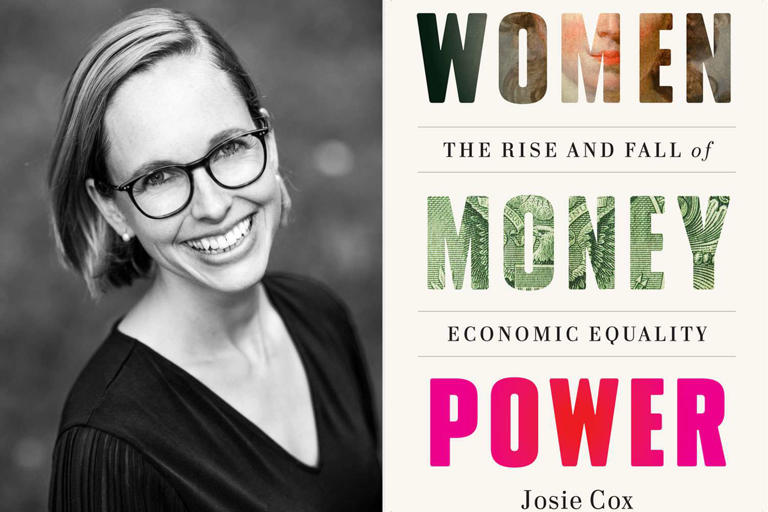
Nancy Borowick, Abrams Josie Cox with her book 'Women Money Power'
© Provided by People
In a sense, business journalist Josie Cox has spent her whole career gearing up to write her new book. Women Money Power: The Rise and Fall of Economic Equality. But one interview with a wealthy business mogul crystallized its urgency.
When Cox asked an ”extremely prominent businessman” about the gender pay gap, he reasoned that “sometimes when women decide to start a family and leave the paid labor market briefly to take maternity leave, when they come back, they're just not as professionally ambitious as men,” Cox tells PEOPLE. "That infuriated me, and it made me realize that these views and these opinions are still so prevalent.”
That fury fueled Cox’s new book (out March 5 from Abrams), which charts women’s fight for financial freedom as well as the social and political hurdles that make it so challenging. It features pioneers who stood up to norms of their time, including the “Rosies” who filled industrial jobs left open by men during World War II, the heiress who helped create the birth control pill, the investor who breached the boys’ club of the New York Stock Exchange and the namesake of equal pay legislation who refused to accept less than she deserved.
As she researched, Cox expected to find a trajectory of progress, a story of hope. But what she found was that American culture has a long way to go.
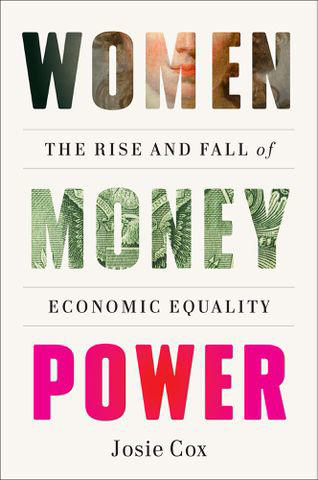
Abrams Cover of Women Money Power:
In a sense, business journalist Josie Cox has spent her whole career gearing up to write her new book. Women Money Power: The Rise and Fall of Economic Equality. But one interview with a wealthy business mogul crystallized its urgency.
When Cox asked an ”extremely prominent businessman” about the gender pay gap, he reasoned that “sometimes when women decide to start a family and leave the paid labor market briefly to take maternity leave, when they come back, they're just not as professionally ambitious as men,” Cox tells PEOPLE. "That infuriated me, and it made me realize that these views and these opinions are still so prevalent.”
That fury fueled Cox’s new book (out March 5 from Abrams), which charts women’s fight for financial freedom as well as the social and political hurdles that make it so challenging. It features pioneers who stood up to norms of their time, including the “Rosies” who filled industrial jobs left open by men during World War II, the heiress who helped create the birth control pill, the investor who breached the boys’ club of the New York Stock Exchange and the namesake of equal pay legislation who refused to accept less than she deserved.
As she researched, Cox expected to find a trajectory of progress, a story of hope. But what she found was that American culture has a long way to go.

Abrams Cover of Women Money Power:
The Rise and Fall of Economic Equality by Josie Cox
© Provided by People
Related: Women's History Month: How It Started, Why We Celebrate in March and More Questions Answered
“Unlike the laws that were introduced in the 1970s and 1980s that prevented a woman from getting fired for getting pregnant, prevented men and women for from getting paid different amounts of money for doing exactly the same work, laws allowing women to get credit to start a business, to get a mortgage to open a bank account — that really led to tangible, measurable progress,” Cox says, explaining, “Culture is not tangible, and it's not measurable. And so that's the part of the equation that we're still struggling to fix.”
One of the pioneers who’s spent the last 40 years as a part of that struggle is Anna “Mae” Krier, 97, the last of the Rosies who took engineering jobs at Boeing when the men were called to fight in WWII. Krier joined the workforce when the country needed women to fill the boys’ shoes in 1941, and hasn’t stopped working for equality since.
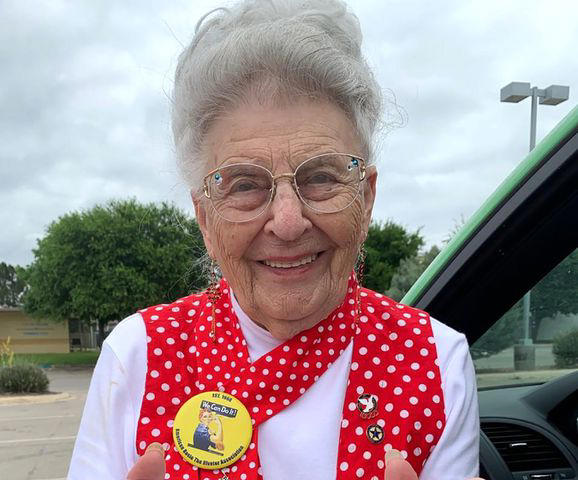
courtesy of Anna "Mae"Krier Mae Krier, one of the original "Rosies"
© Provided by People
Mae still drives herself around in her red Ford pickup (she mused that she'll have to renew her license when she turns 100 in a couple of years) and recently got a chance to get behind the wheel of a Sherman tank when attending a ceremony in Texas. Although she declined the offer to skydive while she was there, she’s not afraid of much, least of all speaking her mind.
“When women went into the workplace, it was the men's world up until 1941. They didn't know how capable American women were, and we were amazing. We were much better than a lot of the men, and they'll even admit that sometimes,” she tells PEOPLE.
“But I've never stopped working for equal pay for the same job, because this was so unfair we were every bit as good or better than the men, and yet they got paid a lot more than we did,” Mae adds. “We’re not there yet, and we’ve got a ways to go.”
Related: Celebrating Women's History Month: These 20 Women's Words Will Undoubtedly Inspire You
It’s no exaggeration to say that Mae and her fellow Rosies helped win the war, but they weren’t treated that way when the troops came home. “The men came home to flying flags and praise, and we came home with the pink slip. The men got the G.I. Bill, education, mortgages. We didn't,” Mae recalls. “In our day, if a man and woman applied for the same job, the man would get his foot in the door, and the woman would go home. So it isn't fair at all.”
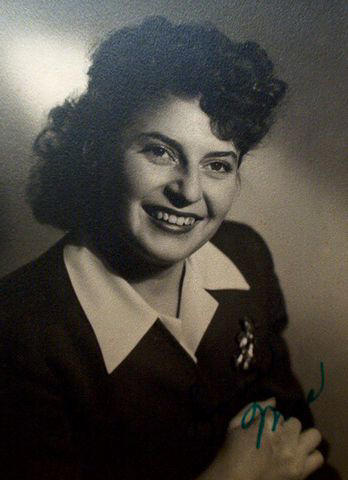
courtesy of Anna "Mae"Krier A younger Mae Krier
Mae still drives herself around in her red Ford pickup (she mused that she'll have to renew her license when she turns 100 in a couple of years) and recently got a chance to get behind the wheel of a Sherman tank when attending a ceremony in Texas. Although she declined the offer to skydive while she was there, she’s not afraid of much, least of all speaking her mind.
“When women went into the workplace, it was the men's world up until 1941. They didn't know how capable American women were, and we were amazing. We were much better than a lot of the men, and they'll even admit that sometimes,” she tells PEOPLE.
“But I've never stopped working for equal pay for the same job, because this was so unfair we were every bit as good or better than the men, and yet they got paid a lot more than we did,” Mae adds. “We’re not there yet, and we’ve got a ways to go.”
Related: Celebrating Women's History Month: These 20 Women's Words Will Undoubtedly Inspire You
It’s no exaggeration to say that Mae and her fellow Rosies helped win the war, but they weren’t treated that way when the troops came home. “The men came home to flying flags and praise, and we came home with the pink slip. The men got the G.I. Bill, education, mortgages. We didn't,” Mae recalls. “In our day, if a man and woman applied for the same job, the man would get his foot in the door, and the woman would go home. So it isn't fair at all.”

courtesy of Anna "Mae"Krier A younger Mae Krier
© Provided by People
Cox hopes her book sheds light not only on the persistent wage gap and how it continues to impact women today, but also help show her own daughter that gender shouldn’t be a deterrent to her dreams.
For her part, Mae travels around the country spreading that same message. “When I speak to these girls [in schools], I say to them, ‘You're just as capable as the boy next to you,’” she tells them. “‘Just don't let him think that he can do it better, because he's a male. That's not the case.’”
Through portraits of the women whose shoulders we all stand on and incisive commentary on how we reach higher from where we stand, Cox hopes her book makes its way to everyone who has a hand in working toward equality. That is, just about everyone.
“I really want to convey with this book that inequality is everybody's problem and as a result of that, everybody stands to benefit from a more equal society and a more equal economy,” Cox explains.
Or, one of Mae’s personal mantras: “Change has got to start somewhere.”
Cox hopes her book sheds light not only on the persistent wage gap and how it continues to impact women today, but also help show her own daughter that gender shouldn’t be a deterrent to her dreams.
For her part, Mae travels around the country spreading that same message. “When I speak to these girls [in schools], I say to them, ‘You're just as capable as the boy next to you,’” she tells them. “‘Just don't let him think that he can do it better, because he's a male. That's not the case.’”
Through portraits of the women whose shoulders we all stand on and incisive commentary on how we reach higher from where we stand, Cox hopes her book makes its way to everyone who has a hand in working toward equality. That is, just about everyone.
“I really want to convey with this book that inequality is everybody's problem and as a result of that, everybody stands to benefit from a more equal society and a more equal economy,” Cox explains.
Or, one of Mae’s personal mantras: “Change has got to start somewhere.”
UN chief: Legal equality for women could take 300 years as backlash rises against women's rights
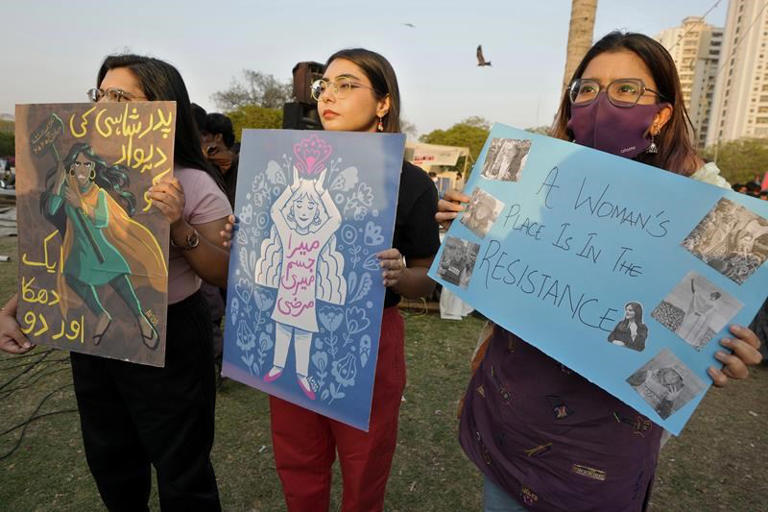
“Poverty has a female face; One in every 10 women in the world lives in extreme poverty.”
UNITED NATIONS (AP) — Legal equality for women could take centuries as the fight for gender equality is becoming an uphill struggle against widespread discrimination and gross human human rights abuses, the United Nations chief said on International Women’s Day.
Secretary-General Antonio Guterres told a packed U.N. commemoration Friday that “a global backlash against women’s rights is threatening, and in some cases reversing, progress in developing and developed countries alike.”
The most egregious example is in Afghanistan, he said, where the ruling Taliban have barred girls from education beyond sixth grade, from employment outside the home, and from most public spaces, including parks and hair salons.
At the current rate of change, legal equality for women could take 300 years to achieve and so could ending child marriage, he said.
Guterres pointed to “a persistent epidemic of gender-based violence,” a gender pay gap of at least 20%, and the underrepresentation of women in politics. He cited September’s annual gathering of world leaders at the U.N. General Assembly, where just 12% of the speakers were women.
“And the global crises we face are hitting women and girls hardest — from poverty and hunger to climate disasters, war and terror," the secretary-general said.
In the past year, Guterres said, there have been testimonies of rape and trafficking in Sudan, and in Gaza women women and children account for a majority of the more than 30,000 Palestinians reported killed in the Israeli-Hamas conflict, according to the Gaza Ministry of Health
He cited a report Monday by the U.N. envoy focusing on sexual violence in conflict that concluded there are “reasonable grounds” to believe Hamas committed rape, “sexualized torture” and other cruel and inhumane treatment of women during its surprise attack in southern Israel on Oct. 7. He also pointed to reports of sexual violence against Palestinians detained by Israel.
International Women’s Day grew out of labor movements in North America and across Europe at the turn of the 20th century and was officially recognized by the United Nations in 1977. This year’s theme is investing in women and girls to accelerate progress toward equality.
Roza Otunbayeva, the head of the U.N. political mission in Afghanistan, told the Security Council on Wednesday that what is happening in that country “is precisely the opposite” of investing in women and girls.
There is “a deliberate disinvestment that is both harsh and unsustainable,” she said, saying the Taliban’s crackdown on women and girls has caused “immense harm to mental and physical health, and livelihoods.”
Recent detentions of women and girls for alleged violations of the Islamic dress code “were a further violation of human rights, and carry enormous stigma for women and girls,” she said. It has had “a chilling effect among the wider female population, many of whom are now afraid to move in public,” she said.
Otunbayeva again called on the Taliban to reverse the restrictions, warning that the longer they remain, “the more damage will be done.”
Sima Bahous, the head of UN Women, the agency promoting gender equality and women’s rights, told the commemoration that International Women’s Day “sees a world hobbled by confrontation, fragmentation, fear and most of all inequality.”
“Poverty has a female face,” she said. “One in every 10 women in the world lives in extreme poverty.”
Men not only dominate the halls of power but they “own $105 trillion more wealth than women,” she said.
Bahous said well-resourced and powerful opponents of gender equality are pushing back against progress. The opposition is being fueled by anti-gender movements, foes of democracy, restricted civic space and “a breakdown of trust between people and state, and regressive policies and legislation,” she said.
“We all feel this pushback acutely,” Bahous said. “Our values and principles have never been as challenged as they are today.”
Guterres urged nations to prioritize equality for women and girls. He announced that the U.N. is launching a “Gender Equality Acceleration Plan” to support governments in designing and implementing policies and spending that respond to the needs of women and girls.
Bahous drew strong applause when she called for a humanitarian ceasefire in Gaza, which Guterres has long sought as well.
She also urged funding for women and girls, stressing that when this happens economies grow, governments thrive and peace is achieved sooner.
“But in spite of these clear facts, we continue to stubbornly invest in weapons more than we invest in women and girls,” Bahous said.
Edith M. Lederer, The Associated Press

“Poverty has a female face; One in every 10 women in the world lives in extreme poverty.”
UNITED NATIONS (AP) — Legal equality for women could take centuries as the fight for gender equality is becoming an uphill struggle against widespread discrimination and gross human human rights abuses, the United Nations chief said on International Women’s Day.
Secretary-General Antonio Guterres told a packed U.N. commemoration Friday that “a global backlash against women’s rights is threatening, and in some cases reversing, progress in developing and developed countries alike.”
The most egregious example is in Afghanistan, he said, where the ruling Taliban have barred girls from education beyond sixth grade, from employment outside the home, and from most public spaces, including parks and hair salons.
At the current rate of change, legal equality for women could take 300 years to achieve and so could ending child marriage, he said.
Guterres pointed to “a persistent epidemic of gender-based violence,” a gender pay gap of at least 20%, and the underrepresentation of women in politics. He cited September’s annual gathering of world leaders at the U.N. General Assembly, where just 12% of the speakers were women.
“And the global crises we face are hitting women and girls hardest — from poverty and hunger to climate disasters, war and terror," the secretary-general said.
In the past year, Guterres said, there have been testimonies of rape and trafficking in Sudan, and in Gaza women women and children account for a majority of the more than 30,000 Palestinians reported killed in the Israeli-Hamas conflict, according to the Gaza Ministry of Health
France 24Gender divide: The ideological gap emerging between young women & menView on WatchDuration 12:16
France 24Calls for equality around the world on International Women's Day1:40WIONGreater economic participation of women essential for India's growth8:07
He cited a report Monday by the U.N. envoy focusing on sexual violence in conflict that concluded there are “reasonable grounds” to believe Hamas committed rape, “sexualized torture” and other cruel and inhumane treatment of women during its surprise attack in southern Israel on Oct. 7. He also pointed to reports of sexual violence against Palestinians detained by Israel.
International Women’s Day grew out of labor movements in North America and across Europe at the turn of the 20th century and was officially recognized by the United Nations in 1977. This year’s theme is investing in women and girls to accelerate progress toward equality.
Roza Otunbayeva, the head of the U.N. political mission in Afghanistan, told the Security Council on Wednesday that what is happening in that country “is precisely the opposite” of investing in women and girls.
There is “a deliberate disinvestment that is both harsh and unsustainable,” she said, saying the Taliban’s crackdown on women and girls has caused “immense harm to mental and physical health, and livelihoods.”
Recent detentions of women and girls for alleged violations of the Islamic dress code “were a further violation of human rights, and carry enormous stigma for women and girls,” she said. It has had “a chilling effect among the wider female population, many of whom are now afraid to move in public,” she said.
Otunbayeva again called on the Taliban to reverse the restrictions, warning that the longer they remain, “the more damage will be done.”
Sima Bahous, the head of UN Women, the agency promoting gender equality and women’s rights, told the commemoration that International Women’s Day “sees a world hobbled by confrontation, fragmentation, fear and most of all inequality.”
“Poverty has a female face,” she said. “One in every 10 women in the world lives in extreme poverty.”
Men not only dominate the halls of power but they “own $105 trillion more wealth than women,” she said.
Bahous said well-resourced and powerful opponents of gender equality are pushing back against progress. The opposition is being fueled by anti-gender movements, foes of democracy, restricted civic space and “a breakdown of trust between people and state, and regressive policies and legislation,” she said.
“We all feel this pushback acutely,” Bahous said. “Our values and principles have never been as challenged as they are today.”
Guterres urged nations to prioritize equality for women and girls. He announced that the U.N. is launching a “Gender Equality Acceleration Plan” to support governments in designing and implementing policies and spending that respond to the needs of women and girls.
Bahous drew strong applause when she called for a humanitarian ceasefire in Gaza, which Guterres has long sought as well.
She also urged funding for women and girls, stressing that when this happens economies grow, governments thrive and peace is achieved sooner.
“But in spite of these clear facts, we continue to stubbornly invest in weapons more than we invest in women and girls,” Bahous said.
Edith M. Lederer, The Associated Press


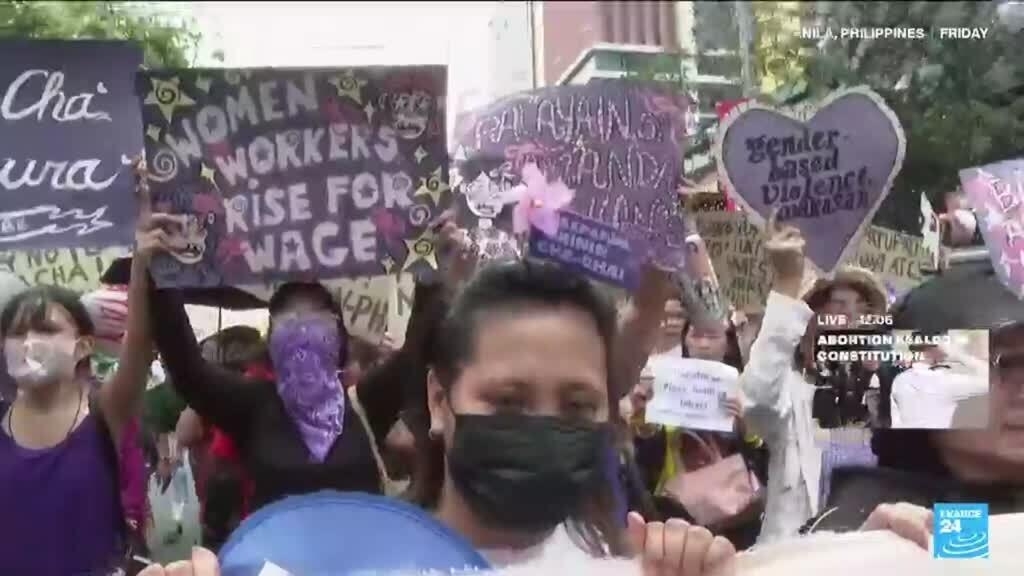
No comments:
Post a Comment